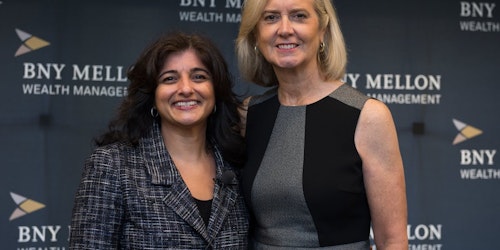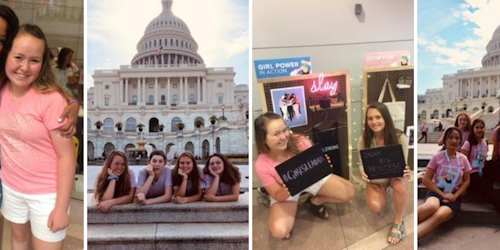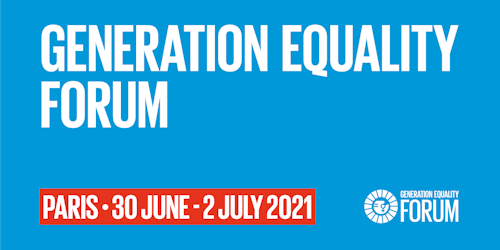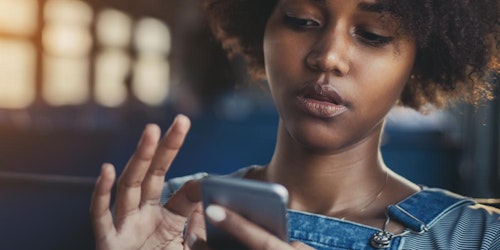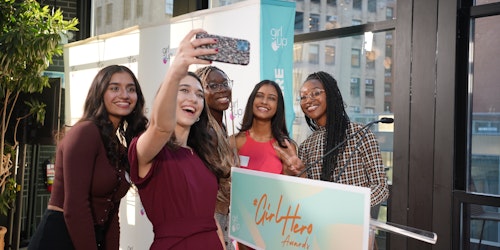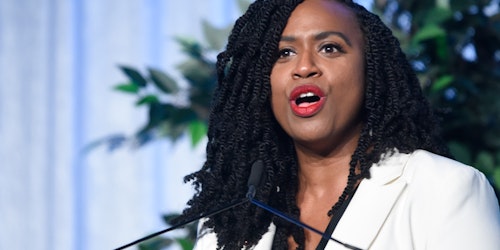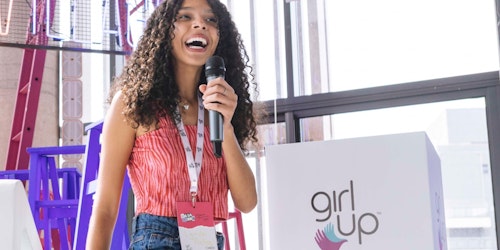International Women’s Day is the perfect occasion to honor all the strides forward made by women in the past year. But in all the excitement of #MeToo, a renewed discourse on sexual harassment, and the #TimesUp spotlight on gender inequality in the workplace, it’s easy to forget the younger voices in the crowd.
Girls and young women often face additional challenges that aren’t so apparent from an outsider’s perspective. We asked three of our Teen Advisors about the hidden issues they face, the importance of global education, and what girls can do in their daily lives to bring about change. Their answers were equal parts inspiring and passionate – check them out below!
*Responses have been edited lightly for clarity.
Meet the Teen Advisors: Fasica Mersha, senior at Parkview High School in Atlanta, Georgia; Angie Jiang, senior, Madison West High School in Madison, Wisconsin; Lauren Woodhouse, junior, Cleveland High School in Portland, Oregon.
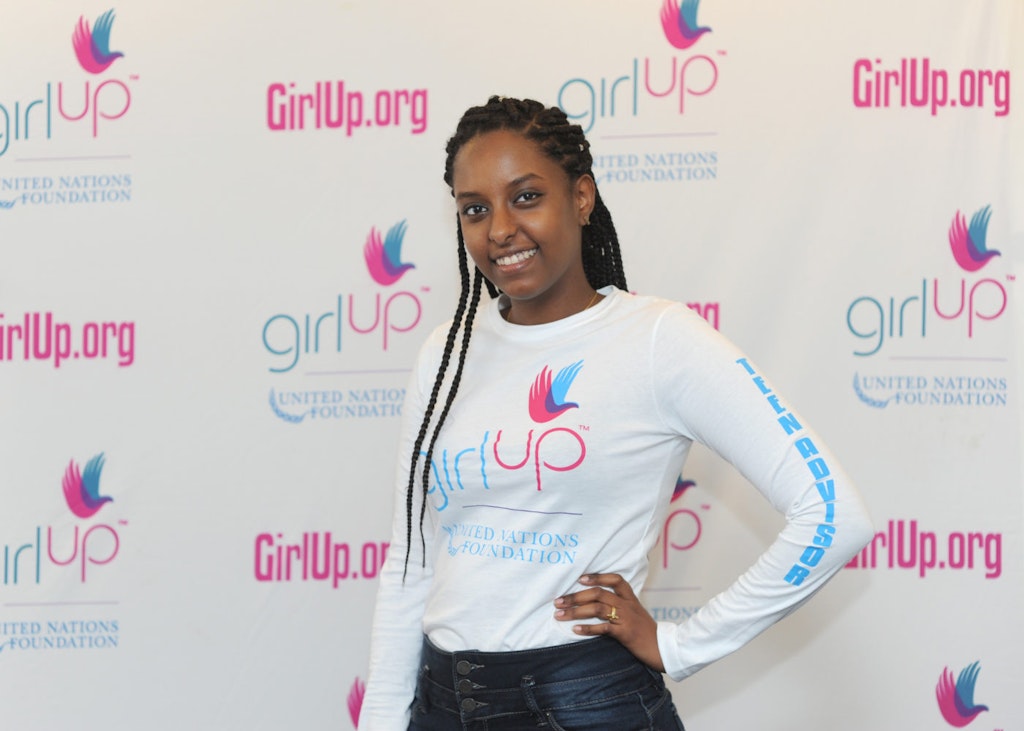
Achieving gender equality in the workforce could add $28 trillion to global GDP by 2025 (McKinsey Global Institute). What can girls and women do in their day-to-day lives to increase gender equality?
Fasica: Women and girls should just continue to know their worth and strive for greatness. We should be demanding the equality that is owed to us as human beings. It is important to never forget that women and girls are capable of achieving anything and to never let anyone say otherwise. It is also important to reach out to men and boys and help them realize that gender inequality is a problem for everyone and the only way to reach true equality is if we work together.
It is also important to reach out to men and boys and help them realize that gender inequality is a problem for everyone and the only way to reach true equality is if we work together.

Angie: Although it is not the responsibility of the oppressed to correct the mistakes of the oppressors, girls and women can help fight for gender equality by supporting and validating the experiences and lives of other girls and women. It’s important to both have mentors and mentor those who identify as female to successfully achieve a brighter future.
Although it is not the responsibility of the oppressed to correct the mistakes of the oppressors, girls and women can help fight for gender equality by supporting and validating the experiences and lives of other girls and women.
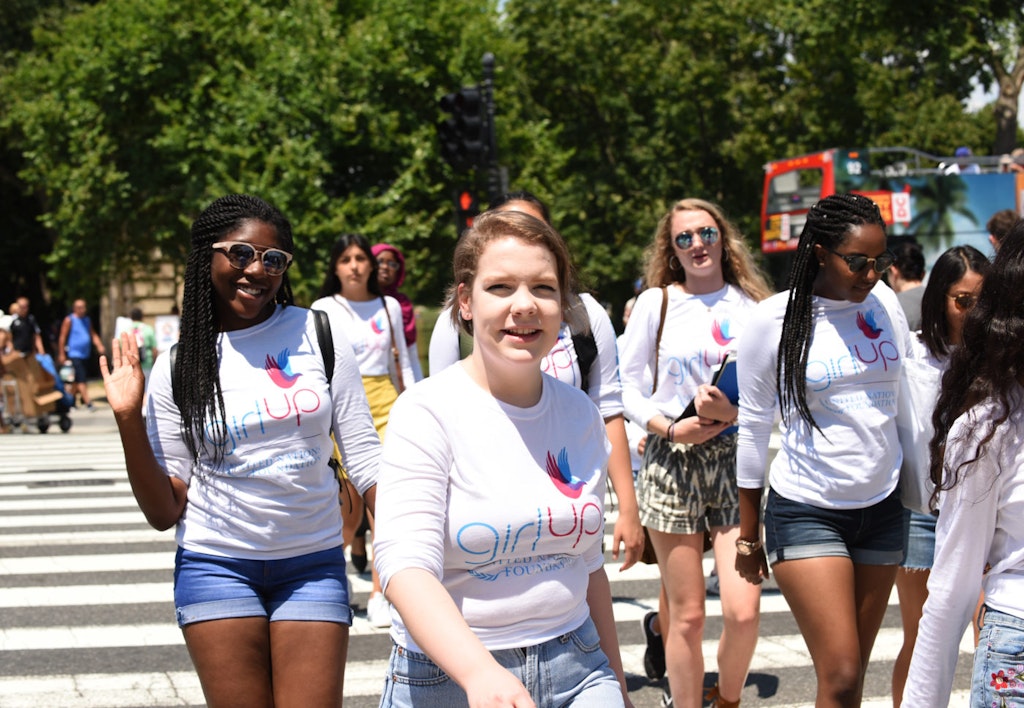
Lauren: Fighting to change the culture of your own community is the most important thing one can do in the fight for gender equality. It all boils down to simply supporting other females around you. The only way we are going to break the glass ceiling is together. This means supporting trans women, women of color, and other women typically left behind by the contemporary feminist movement. Ways in which girls and women can do this is by donating to charities that uplift these women, educating themselves on how to further their feminist reach, and frequently checking privilege when engaging in discussion. Ultimately all women are working toward the same goal and we will watch that ceiling fall together soon.
What is the largest issue faced by young women and girls that doesn’t receive enough attention?
Fasica: As a girl living in a developed country such as the United States it is impossible for me to truly understand what issues matter the most for girls whose voices are silenced. However, I strongly believe that one of the gravest issues that face women and girls is gender-based violence. There are women and girls who are suffering from torturous acts such as female genital mutilation and rape, one of the greatest human travesties. Women and girls should be able to achieve a level of equality that allows them pursue their dreams, but first they must feel safe and not have to worry for their lives as they walk down the street.
Angie: Although we can all agree that human trafficking is a heinous crime committed by heartless people, it persists as one of the most pressing issues that women and girls face all over the world. Even in developing nations, trafficking, especially for sexual slavery, is committed every day, taking agency and futures away from millions of girls.
Lauren: The largest issue that young girls face today is the pattern of underestimation and disregard from governments and authority figures towards our own agency. In my opinion, this issue materializes at the heart of almost every gender issue we see today. For example, women in America and abroad are forced to jump through hoop after traumatic hoop just to get an abortion because lawmakers don’t believe we can be trusted to make these sort of decisions. Also examining lack of access to education, people make decisions on behalf of these girls to not enroll them in school, often without consulting the girl because they believe that is what’s best for them. Ultimately, this world needs to start giving young women and girls more credit and mobility to make their own decision about what’s best for them.
“Ultimately, this world needs to start giving young women and girls more credit and mobility to make their own decision about what’s best for them.”
Teen Advisor Angie Jiang at the Social Good Summit with musician Madame Ghandi (Photo by Diane Bondareff for Girl Up)
In a world where education has proven to be an ideal vehicle for social mobility, a shocking 62 million girls globally still aren’t in school (Girl Up). Why do you think that is?
Fasica: I believe that girls are not receiving a quality education due to both cultural barriers and lack of access. I understand that in some cultures and societies, a girl’s education is not valued. Although I strongly disagree it is not in anyone’s power to automatically alter a collective mindset, all we can do as activists and global citizens is work towards increasing access to education and try to help societies realize the importance of it in time.
Angie: Although culture can be a contributing factor, the idea that girls and women are forbidden from going to school is beginning to be replaced with the idea that priority must be given to boys and men. These cultural remnants of the patriarchy are hard to erode but must be done so with understanding to avoid neo-colonialism and neo-imperialism.
Lauren: It’s evident that some cultures don’t believe girls should pursue an education due to the simple fact that they are girls.That cultural belief is emboldened and not given a chance to change when there is such poor access to education for girls. These access issues can present themselves as lack of funds, forced marriage, the potential for sexual, physical, or emotional violence, long and unsafe traveling distances, and forced labor on top of many, many other things. This is why it is so imperative that programs are put in place to mend these issues to stop the cycle of educational inequality.
Fasica, Angie, and Lauren are all members of the 2017-2018 Girl Up Teen Advisor Class.
